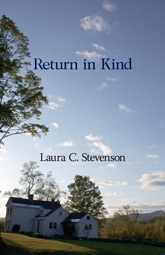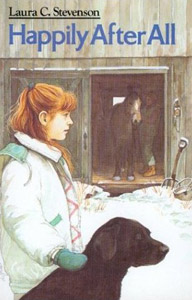A New Series: One Minute Reviews of
Books by Vermont Authors
Laura's column "One Minute Reviews" has appeared bi-weekly in Wilmington, Vermont's Deerfield Valley News since 2015. In April 2018, she found that no Vermont periodical consistently reviews all commercially published fiction and non-fiction by Vermont authors, so she started a series to fill that void. Published reviews from that series and some earlier reviews of local authors are listed with links to a scan of the printed copy. Reviews still in queue are listed without links until they appear in print.
The books reviewed in this series are available through Wilmington's Pettee Memorial Library, the Whitingham Free Public Library, and locally owned Bartleby's Books in Wilmington.
Deerfield Valley News, 6/14/2018
Splendidly Researched Novel of Vermont History
Beth Kanell, The Long Shadow. Gale, a Cengage Company, 2018.
It's March 1850 in North Upton, Vermont, where fifteen-year-old Alice Sanborn is the only girl in a prosperous farming family. She and her friend Jerushah, the daughter of the inn-keepers across the road, consider themselves the adopted sisters of twelve-year-old Sarah, a slave recently brought to the village by Miss Farrow, a black abolitionist from St. Johnsbury. Sarah is quietly accepted in North Upton, but her safety is endangered when Alice's brother William and Jerushah's brother Matthew hide a fugitive slave, a project that introduces them to the young traveling abolitionist Solomon MacBride. In the midst of the Sanborn's sugaring-off party, word comes that a bounty hunter is only a few miles away. William and Matthew hurry north with the fugitive -- but the village derelict tells the bounty hunter about Sarah's presence in North Upton. The girls, fearing for Sarah's safety, accompany her first to Miss Farrow's house in St. Johnsbury, and then, as they are still followed, to Coventry to leave Sarah with the Hayes family, free blacks that live close to the border. Their brothers and Solomon do the driving at different times, but as they struggle over roads alternately swept with snow, mired in ruts, and flooded by rushing streams, Jerushah and Sarah develop scarlet fever, forcing the three girls to stay in Coventry for weeks. Tragedy in North Upton sends Solomon to Coventry to drive Jerushah and Alice home – a difficult journey made worse by Jerushah's hostility as it becomes clear that Solomon and Alice have formed a tentative emotional bond. That bond, along with Alice's consciousness that she has the strength and will to work for abolition, changes her future prospects unalterably, even though wrenching loss and grief show her how deeply she cares for her family. As the book closes, she is no longer a girl, but a woman who must choose her own path.
Kanell tells Alice's coming-of-age story with admirable sensitivity to its cultural setting. Though inquisitive and determined, Alice is silent when men are speaking; she accepts her place in the kitchen instead of the barn or mill, and she lives by her mother's quiet creed: "Set your hands to work, and let God hold your heart." Originally, she shares her mother's confidence that "one by one, we will save [slaves]", but when she learns that there are three and a half million slaves to save, she realizes that piecemeal efforts cannot solve a problem of such magnitude. She respects her father's desire to support of the Union above all, but she also sympathizes with her uncle, who leaves North Upton to run an abolitionist newspaper in Illinois, and she actively helps Solomon and her brothers set up a means for black men to find apprenticeships in Vermont. Alice's hopes and difficulties accurately portray the distressing political realities of the 1850's; Kanell carefully avoids repeating stereotyped, romanticized legends of The Underground Railroad.
One of the chief delights of Kanell's careful research is her intimate portrayal of 1850's Vermont life. Watching Alice and her mother, we experience the constant necessity of tending stove fires, the bustle of cooking for thirty guests, the darkness of trips to the root cellar, the sights and smells of the barn in lambing season, the difficulties of managing long skirts in the snow and mud, the damp stuffiness of a jolting carriage, the bone-chilling cold of riding in a sleigh, the slow pace of travel, and the dangers of night driving in a landscape still inhabited by cougars and wolves. These and many other details remain at the back of the reader's mind long after the book is closed, bringing to life the context of the arguments and moral quandaries of Vermonters in the decade before the Civil War.


